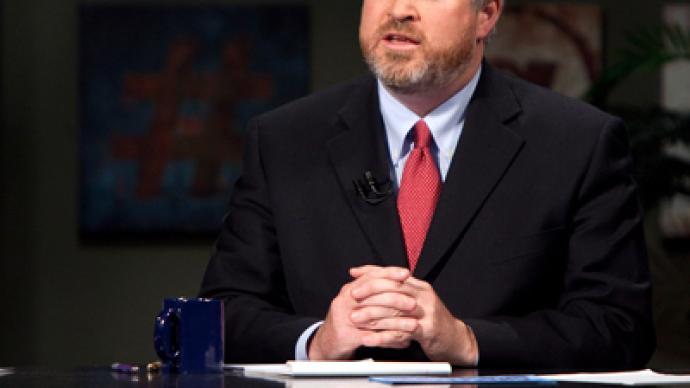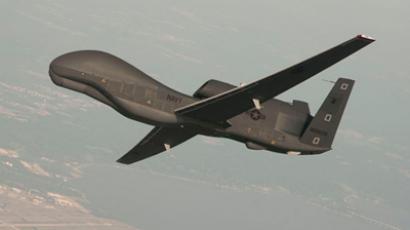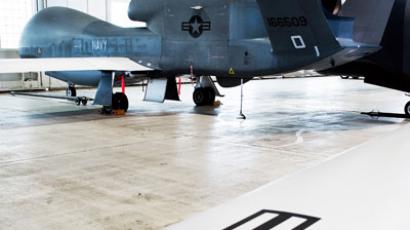Seattle mayor forces police to abandon spy drone program

The city of Seattle, Washington has taken the forefront in a fight spreading across the United States against the use of invasive police drones to conduct sweeping surveillance in locales from coast to coast.
Seattle Mayor Mike McGinn announced on Thursday that the city’s police department is abandoning plans to put unmanned aerial vehicles — UAVs, or drones — into the sky. But as the use of these aircraft and their high-tech capabilities take center stage in the media, other city executives across the US are making similar decisions.Last spring, the Seattle Police Department confirmed the acquisition of a 3.5 pound Draganflyer X6 Helicopter Tech drone, an aircraft that at the cost of $41,000 could have allowed authorities in the Pacific Northwest city to spy from above on a town of over 600,000. When the agency introduced the aircraft last year, it was touted as being both an entertaining and useful tool for law enforcement to use during search-and-rescue missions. "It's very fun," Officer Reuben Omelanchuk told the Seattle Times in April, "But doing it safely can be stressful at times." As a public backlash amounted in the months since, though, with civil liberty advocates taking charge in a fight to forego the use of drones, Mayor McGinn announced this week that the initiative will be aborted in lieu of other activities. "Today I spoke with Seattle Police Chief John Diaz, and we agreed that it was time to end the unmanned aerial vehicle program, so that SPD can focus its resources on public safety and the community building work that is the department's priority," the mayor said to the media on Wednesday.A report from CBS News says the cancellation of the UAV program will mean that the Seattle PD will retire two small drones obtained through a federal grant. In April’s Seattle Times article, the paper quotes Lt. Greg Sackman of the department's Arson/Bomb Squad as saying a second UAV had been given to the King County Sheriff's Office and was also purchased thanks to a regional grant from the federal Urban Area Security Initiative.Advocacy groups opposed to the use of domestic drones for surveillance have celebrated Mayor McGinn’s decision, with American Civil Liberties Union spokesman Doug Honig telling the press that the ACLU applauds his action because "Drones would have given the police unprecedented abilities to engage in surveillance and intrude on the privacy of people in Seattle,” despite the fact that “there was a never a strong case made that Seattle needed them for public safety."“It’s a wise decision,” says Honig.So wise, it seems, that others are in the same mindset. The Florida State Senate Community Affairs Committee decided this week to vote in favor of a bill that will forbid the use of drones for law and code enforcement, much to the chagrin of police officers who asked for a revised edition with increased surveillance abilities. There in the Sunshine State, police agencies were hoping the committee would approve an exception in a drone bill that would allow law enforcement agencies to bypass a ban on UAVs so that they could be utilized to spy on large crowds."We do not want to use the drone to fly over people's houses, seeing what they're doing in their backyards," Orange County Sheriff's Capt. Michael Fewless told the committee in support of the exception. "What we are looking for is large scale events."Earlier this week, however, the committee advanced the bill without including that exception favored by Capt. Fewless and other local law enforcement officers. One opponent of that amendment, in fact, put the captain’s plea in historical perspective to stress what he sees as a constitutional violation."We know something about crowds," Sen. Joe Negron, a Stuart Republican sponsoring the bill, told the committee. "We had a crowd back in the 1700s. It was called the Boston Tea Party. Can you imagine if King George had sent a drone to hover over the Boston Tea Party to see what the American patriots were up to?""We have a responsibility to protect people's liberty, but I think we have also a responsibility to protect people's lives," added Sen. Jack Latvala, R-Clearwater.The bill must clear three more committees before it gets a floor vote, reports the Herald, but if it’s approved in its current form it will only permit police to use UAVs for certain emergencies, suspected terrorism and surveillance that's been approved by a judge. "What we're talking about here is Big Brother and the idea that Big Brother is watching," said Sen. Geraldine Thompson, D-Orlando.And with anti-drone initiatives winning on both the east and west coast, there’s expected to be similar results coming from elsewhere. Also this week, the city of Charlottesville, Virginia passed a resolution by a 3-2 vote that will ban the use of surveillance drones for the next two years. Another bill presented in Oregon would influence the regulation of airspace in the state, thus limiting where drones could fly."We are not and should not be a surveillance state. Drones should never be used for mass surveillance. Law enforcement should only use them when there is individualized suspicion of criminal wrongdoing,” Becky Straus, legislative director of ACLU's Oregon office, tells US News & World Report. But while anti-drone activists in Seattle may have had one significant victory against the expanding surveillance state this week, it wasn’t without complications. It had just been revealed that that very city is in the midst of installing 30 surveillance cameras that will create a “wireless mesh network security system” that can be monitored by law enforcement agencies across the region. Meanwhile, the results of a Freedom of Information Act request made by the Electronic Frontier Foundation and published on the Web this week reveal that 20 new entities have applied to the Federal Aviation Administration in hopes of securing a drone license. According to paper obtained by the EFF, over 81 organizations have formally asked the FAA for permission to fly drones.














